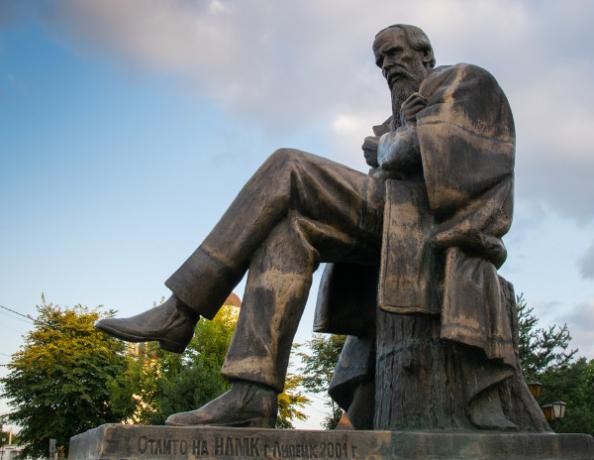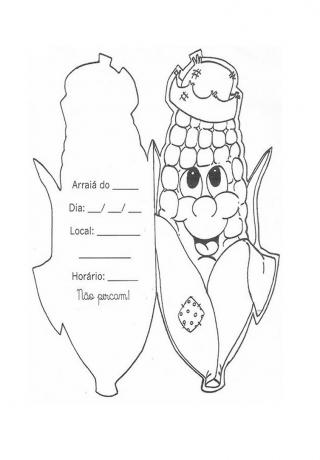Fyodor Dostoevsky, Russian writer, was born on November 11, 1821, in Moscow. Three years after the success of his first book — poor people — published in 1846, was arrested for political reasons and sentenced to death. The sentence, however, was overturned, and the author was then sentenced to carry out forced labor for four years in a prison in Siberia.
Your works are linked to Russian realism and present sociopolitical criticism, stream of consciousness, and marginalized characters. Thus, the author, who died on February 9, 1881, in St. Petersburg, brings out deep elements of the human soul and, in this way, ended up influencing philosophers such as Nietzsche and Sartre.
Read too: Leo Tolstoy — leading representative of Russian realism
Biography of Fyodor Dostoevsky
Fyodor Dostoevsky born November 11, 1821, in Moscow, Russia. He was the son of a doctor, an authoritarian and demanding man who encouraged Fyodor and his brother Mikhail to study and read. But when, in 1837, the writer's mother died of tuberculosis, Dostoevsky's father, disgusted, gave in to alcoholism and became even more intractable.

The following year, the author began studying at the School of Military Engineers in St. Petersburg, influenced by his father, who was murdered in 1839. So, when he finished his studies in 1843, the writer went to work as an ensign. But after experiencing the bohemian life of the city, he left his job in 1844 to devote himself to literature.
your first novel — Poor people — was published in 1846. The following year, Dostoevsky became involved with a group of young men who were critical of tsarism. So, in 1849, the novelist was arrested and sentenced to death. However, at the last minute, that penalty was revoked, and the writer was sentenced to forced labor in Omsk, Siberia, for four years, followed by another four years as a soldier.
After leaving prison in Omsk in 1854, he served his sentence as a soldier in Semipalatinsk, where he met Maria Dimitrievna (1824-1864), a married woman. However, he was able to marry her in 1857 when he became a widow. On the night of the wedding, the writer had an epileptic seizure. It was the beginning of an unhappy marriage, which would end seven years later, with the death of his wife, a victim of tuberculosis.
Time served, Fyodor Dostoevsky returned to Russia in 1859 with his wife and stepson. At first they lived in the city of Tver and then they went back to live in St. Petersburg. Later, in 1862, he published his book Memories from the House of the Dead and in this way he was again admired as a writer.
That year, he made his first trip to countries in Europe and fell in love with Paulina Súslova, a 16-year-old girl. Two years later, with the death of his brother, Dostoevsky decided to keep the newspaper created by him — Era. In addition, he became a widower and, in 1865, traveled to countries in Europe for the second time, meeting the young Paulina, who rejected his marriage proposal.
In 1866, he met the young stenographer Anna Grigórievna (1846-1918), and they married a year later. Threatened by creditors, the writer decided to leave Russia. In the company of his wife, he lived in european countries for approximately four years. In 1868, their first child was born in Switzerland and died in the same year.
In 1872, in Russia, the novelist became editor-in-chief of the newspaper the citizen. Thus, he spent the next few years dedicated to writing. However, epileptic seizures were recurrent, and the writer's health became more fragile over the years. He died on February 9, 1881, in Saint Petersburg.
Literary Characteristics of Fyodor Dostoevsky
The works of Fyodor Dostoevsky — one of the main authors of realism in Russia — have the following characteristics:
sociopolitical criticism;
psychological analysis;
interior monologue;
conservatism;
nationalism;
prolixity;
descriptive character;
marginalized characters;
absence of idealizations;
philosophical depth;
Read too: Naturalism — the most extreme current of the realist movement
Works by Fyodor Dostoevsky

poor people (1846)
the double (1846)
Mr Prokhartchin (1846)
novel in nine letters (1847)
the landlady (1847)
white nights (1848)
Weak heart (1848)
the honorable thief (1848)
A Christmas Tree and a Wedding (1848)
The wife of another and the husband under the bed (1848)
Netochka Nezvanova (1849)
the little hero (1849)
uncle's dream (1859).
Stiepantchikov village and its inhabitants (1859)
Humiliated and offended (1861)
Memories from the House of the Dead (1862)
an unpleasant story (1862)
Underground Notes (1864)
the crocodile (1865)
Crime and Punishment (1866)
The player (1867)
The idiot (1869)
the eternal husband (1870)
The demons (1872)
Bobok (1873)
the teenager (1875)
a gentle creature (1876)
The Muzhik Marei (1876)
a ridiculous man's dream (1877)
The Karamazov brothers (1881)
The book The idiot is one of the author's best known. In this work, the protagonist is Prince Liév Nikolaevitch Míchkin. After living in Switzerland for a few years, he returns to St. Petersburg. The 26 year old has epilepsy. At first, the title of the work refers to the supposed sequel of the disease, that is, to idiocy. But, throughout the narrative, we notice that the title has a double meaning.
After all, this adjective is mainly used to indicate the prince's compassion, generosity and sincerity. THE work, therefore, criticizes the Russian society of the time, in which there was no place for a good man. However, the theme is current and universal, as, in any part of the world, the discussion about the ethical behavior remains pertinent, aside from the fact that some people are still considered idiots for doing the right thing.
Mikkin is the hero ridiculed for expressing good human values. He is a superior soul, but considered weak by the corrupt people around him. Parfión Rogójín, on the other hand, is the opposite of the prince. Apparently they're friends. However, the two become involved with the beautiful and seductive Nastasya Filippovna.
See too: The Posthumous Memoirs of Bras Cubas— great classic of Brazilian realism
Influence of Fyodor Dostoevsky
Fyodor Dostoevsky influenced many artists and intellectuals.
In literature:
André Gide (1869-1951);
William Faulkner (1897-1962);
Georges Bernanos (1888-1948).
in philosophy and politics:
Jean-Paul Sartre (1905-1980);
Friedrich Nietzsche (1844-1900);
Martin Heidegger (1889-1976);
Mikhail Bakhtin (1895-1975);
Lev Shestov (1866-1938).
in psychoanalysis:
Sigmund Freud (1856-1939).
Phrases by Fyodor Dostoevsky
Next, we are going to read some sentences by Fyodor Dostoevsky, taken from his works The demons, The idiot, Bobok and Memories of the house of the dead.
"The man is unhappy because he doesn't know he is happy."
"It wasn't when he discovered America, but when he was about to discover it, that Columbus was happy."
"Life and lies are synonymous."
"There are no trivial prejudices."
"A being that gets used to everything, this is the best definition we can give of man."
Image credits
|1| Pavel Sapozhnikov / Shutterstock.com
|2| Publisher 34 (reproduction)
by Warley Souza
Literature teacher
Source: Brazil School - https://brasilescola.uol.com.br/literatura/fiodor-mikhailovitch-dostoievski.htm

